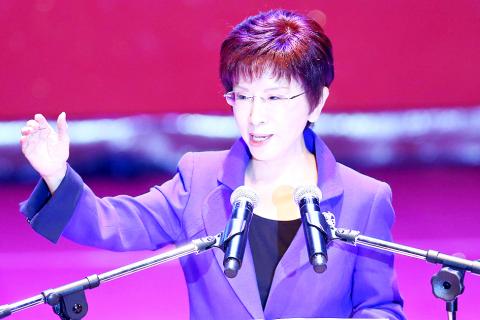Against a backdrop of chants from supporters of Deputy Legislative Speaker Hung Hsiu-chu (洪秀柱) outside, the Chinese Nationalist Party’s (KMT) extempore congress yesterday voted by a wide margin in favor of a motion to rescind Hung’s nomination as the party’s presidential candidate.
The motion was passed by a landslide vote of 812 to 79 at the congress at the National Sun Yat-sen Memorial Hall in Taipei in the afternoon, putting an end to Hung’s candidacy, which had been dogged by rumors about the KMT leadership’s plan to replace her since the beginning.
Among the supporters of the motion were President Ma Ying-jeou (馬英九) and Legislative Speaker Wang Jin-pyng (王金平), as well as former KMT chairmen Lien Chan (連戰) and Wu Poh-hsiung (吳伯雄).

Photo: CNA
The conference briefly descended into chaos when pro-Hung representative Yu Hao (游顥) spoke against a proposal by the meeting’s chairman, former KMT vice chairman Lin Feng-cheng (林豐正), to vote on the motion by a show of hands — as opposed to KMT congress’ traditional voting through applause — due to the significance of the matter.
Yu proposed putting the motion to a secret vote, a suggestion dismissed by many other party representatives at the meeting, with some shouting: “Just vote by a show of hands.”
The congress came just 10 days after the KMT set in motion plans to force Hung out of the Jan. 16 election. The party’s Central Standing Committee on Oct. 7 unanimously passed a motion — without putting it to a vote — to hold a provisional party congress aimed at changing the candidate and forging party unity.

Photo: Huang Wen-huang, Taipei Times
With unusual speed, KMT headquarters finalized the date for the congress only five days later, before the committee on Wednesday passed another motion calling for Hung’s nomination to be rescinded, in an effort to create a basis for the congress’ plan to put Hung’s candidacy to a vote at yesterday’s convention.
In her opening address earlier to the special congress, Hung said she had qualms about “troubling party representatives to come here again” to deliberate on her presidential nomination.
“Reminiscing about the cheering [I received] at the July 19 national congress, I am here today in the same place and with the same group of people, but the ideas harbored in their minds might be vastly different than they were three months ago,” she said.
Hung said the KMT’s disastrous defeat in last year’s nine-in-one elections crushed almost every ounce of the party’s courage to stand up and fight in the presidential and legislative elections.
Early this year, amid a dismal atmosphere, all of the KMT’s heavyweights declined to compete in the upcoming race, despite repeated calls from party members and supporters, Hung said.
“To spare the KMT from potential ridicule stirred up by having no one to contest the elections, I shouldered the responsibility and joined the primary in the hope of encouraging other party members to come forward at such a difficult time for the party,” Hung said.
Having fulfilled the KMT’s primary requirements of signature and poll thresholds, Hung said she is the first KMT presidential candidate to be nominated through the party’s democratic primary mechanism.
“The Republic of China [ROC] has been a beacon of democracy for all people of Chinese ethnicity. The decision reached at today’s congress will not only be closely watched by KMT members, but also by Taiwanese and every ethnic Chinese who cares about democracy,” Hung said.
The choice KMT representatives made has to answer to the public and to history, Hung said.
“Should we base our decisions on social perceptions, public opinions and our beliefs, or sacrifice the KMT’s democratic systems and put the party’s integrity, principles and spirits in jeopardy for the mere sake of election results?” she asked.
Hung said that the KMT might abandon her, but she would never forsake the party.
During the congress, Ma urged party members to support and unite behind the decision made by the congress, the KMT’s highest organ.
Lien said he was moved by Hung’s speech and praised her dedication and willingness to step up at the KMT’s most difficult time.
Wu said Hung’s address would be an important page in the KMT’s history.
Speaking prior to the vote, Wu said Hung would be the biggest winner, regardless of whether the congress nullified her nomination.

The CIA has a message for Chinese government officials worried about their place in Chinese President Xi Jinping’s (習近平) government: Come work with us. The agency released two Mandarin-language videos on social media on Thursday inviting disgruntled officials to contact the CIA. The recruitment videos posted on YouTube and X racked up more than 5 million views combined in their first day. The outreach comes as CIA Director John Ratcliffe has vowed to boost the agency’s use of intelligence from human sources and its focus on China, which has recently targeted US officials with its own espionage operations. The videos are “aimed at

STEADFAST FRIEND: The bills encourage increased Taiwan-US engagement and address China’s distortion of UN Resolution 2758 to isolate Taiwan internationally The Presidential Office yesterday thanked the US House of Representatives for unanimously passing two Taiwan-related bills highlighting its solid support for Taiwan’s democracy and global participation, and for deepening bilateral relations. One of the bills, the Taiwan Assurance Implementation Act, requires the US Department of State to periodically review its guidelines for engagement with Taiwan, and report to the US Congress on the guidelines and plans to lift self-imposed limitations on US-Taiwan engagement. The other bill is the Taiwan International Solidarity Act, which clarifies that UN Resolution 2758 does not address the issue of the representation of Taiwan or its people in

US Indo-Pacific Commander Admiral Samuel Paparo on Friday expressed concern over the rate at which China is diversifying its military exercises, the Financial Times (FT) reported on Saturday. “The rates of change on the depth and breadth of their exercises is the one non-linear effect that I’ve seen in the last year that wakes me up at night or keeps me up at night,” Paparo was quoted by FT as saying while attending the annual Sedona Forum at the McCain Institute in Arizona. Paparo also expressed concern over the speed with which China was expanding its military. While the US

SHIFT: Taiwan’s better-than-expected first-quarter GDP and signs of weakness in the US have driven global capital back to emerging markets, the central bank head said The central bank yesterday blamed market speculation for the steep rise in the local currency, and urged exporters and financial institutions to stay calm and stop panic sell-offs to avoid hurting their own profitability. The nation’s top monetary policymaker said that it would step in, if necessary, to maintain order and stability in the foreign exchange market. The remarks came as the NT dollar yesterday closed up NT$0.919 to NT$30.145 against the US dollar in Taipei trading, after rising as high as NT$29.59 in intraday trading. The local currency has surged 5.85 percent against the greenback over the past two sessions, central